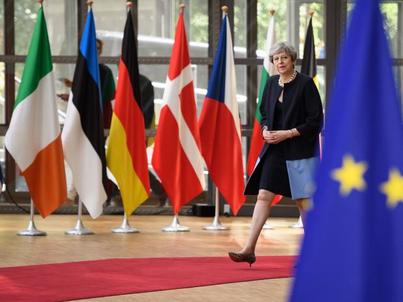
How disappointing that she has rolled over and her ‘man of straw’, ‘sitting on the fence’ persona has glaringly shown through. If you want to convey strong leadership and guts, you don’t try and please everyone, and you certainly do not show your full hand. You fight every inch of the way to get the very best deal for your country. Mrs May has left the UK with few, if any bargaining tools.
There have been constant complaints from some sectors of the media, politicians and businesses that there is a lack of ‘clarity’ about what and when the result of Brexit will mean. By consenting to the two year ‘transition’ period in her Florence speech, Mrs May missed a vital opportunity and failed to take advantage of the strong hand of cards she held.
It is essential for business, including agriculture for which Brexit offers a unique and glaring opportunity, that from March 2019 Britain should be able to get on with negotiating and signing free trade deals with countries outside the EU, which account for four-fifths of the global economy. They are queuing up, keen to trade with us.
The halfway house Mrs May has signed up to, leaves the UK subject to the European Court of Justice, the Single Market with multi-billion pound annual payments, and freedom of movement but no influence. What happened to ‘Brexit means Brexit’ Prime Minister?
Those of us who live in the countryside know that for some, it can be a lonely place, but also peaceful and cathartic. To see the changing seasons, nature of all varieties, farm livestock, birds, wild animals, flora and ancient trees is a privilege.
The countryside can be remote, particularly for those working day in and day out alone. Charities such as RABI do valuable work identifying and supporting isolated farmers who are vulnerable. And local communities are vital, including postmen who are often the only link with the outside world.
Last week a report highlighted research which has been pioneered by clinicians working with people of all ages, suffering from mental health issues.
Interestingly a form of treatment proving effective, is the opportunity to spend time walking in green spaces or the countryside. Encountering wildlife, and getting involved with caring for livestock and watching things grow is particularly helpful.
Reports that a quarter of 14 year old girls, and 9 per cent of boys are hit by depression, and struggle with the pressure of life today, are deeply disturbing.
I would hazard a guess that much of this is down to a lack of rules, proper parenting, political correctness and social media.
Too many children today live in the grey area between the black and white lines that were once in place for previous generations. Then there were rules and boundaries at home, at school, and within communities where doors were open, and people cared.
If children stepped over that line they knew the consequences. Today there is a free for all which has resulted in a complete lack of discipline and respect for themselves, let alone anyone else.
Young people face unkindness, and in many cases a savagery, leaving as this report highlights, children feeling vulnerable, isolated and in many cases deeply troubled and afraid.
The present system managing mental health is quite unable to cope. What will happen as numbers increase as they surely will, should concern us all. It is time to address the roots of the problem before they escalate further, by bringing back rules and discipline, and above all a sense of pride and respect amongst children of all ages, in school, at home and within communities.
The current situation is not progress, it is recession into the dark ages.

 RSS Feed
RSS Feed